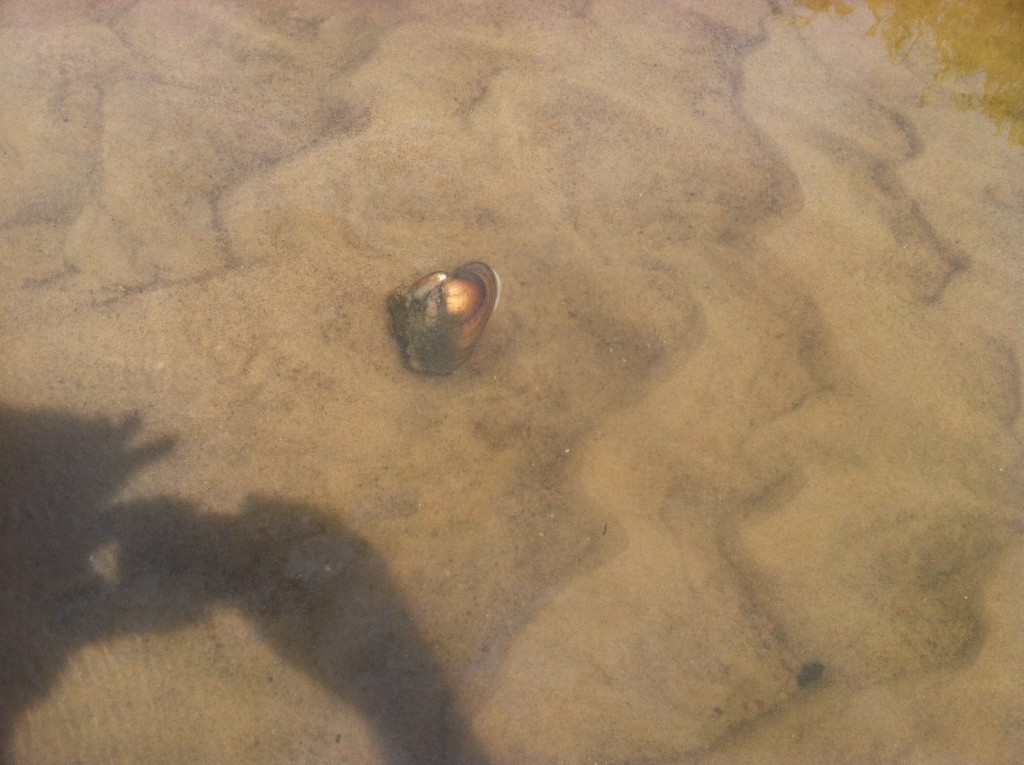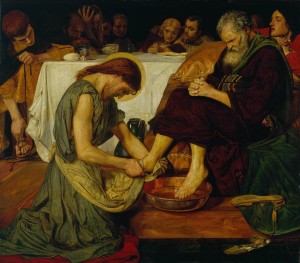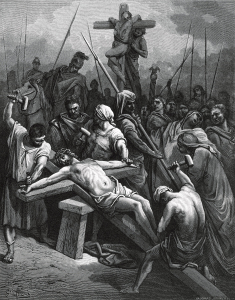I’ll admit it. I’m a bit of a soccer nut. My family, for example, generally doesn’t watch television, but when the World Cup comes around once every four years, as it did last year, I break down and sign up for cable TV and DVR service and binge on as many games as I can manage, inviting friends over as well.
Spend enough time watching any sport, of course, and you’re likely to see deeper significance in it. While I’m tempted to, I’m not going to seriously suggest that God’s favorite sport is soccer. Nor will I suggest that the angels gather together to watch the World Cup, waving the flags of their favorite countries.
But I’ve long had some whimsical thoughts about some parallels between soccer and the kingdom of God. The beauty of a blog is that you have the chance, like I am doing here, to explore those thoughts. I hope there is at least a sentence or idea here that makes the reading of this rewarding for you.
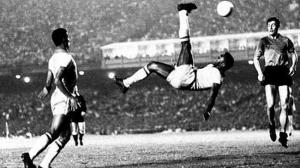
Pele unleashing a bicycle kick. Brazil has long loved soccer and has long called it “jogo bonito” (the beautiful game).
I need to start by saying that I can’t recall ever hearing a sermon about the kingdom of God when I was growing up. So I’ve been shocked and surprised in my adult years to find that Jesus spoke so much about it
“Kingdom” refers to a place where the rules and intentions of a king are followed. In short, and to borrow the language of the Lord’s Prayer, it is a place where the king’s will is done.
For Americans who have grown up celebrating our revolution against a British king and have created a culture of freedom, it can hard to have any positive feelings about the idea of a kingdom. But the God that Jesus reveals to us is not comparable to a human king, and the kingdom that Jesus taught us about is not like any ruled territory in human history.
This is because the intentions and will of God are, from our human perspective, revolutionary. This is because God and God’s ways are the source of a truly abundant life. The kingdom of God is a state of being where love rules, where compassion reigns, where all are taken care of, where all have access to what they need, all are treasured, all are humble, and where God’s “electricity” (a wonderful metaphor used by Dallas Willard) runs through everything that is done and through everyone’s hearts. In short, the kingdom of God is the state in which we live individually and together with God, other people, and Creation as we were meant to.
God’s kingdom is truly a beautiful kingdom.
And when people, inspired by God and filled with God’s Spirit, actually live out God’s ways in this world, even for short periods of time and in imperfect ways, we get a small glimpse of what that beautiful kingdom truly will be in its fullness some day.
So what does this beautiful kingdom, which we are called to seek and to advance in this world, have to do with a beautiful game called soccer? And what does the beautiful kingdom have to do with God’s beautiful world?
Soccer and the kingdom of God upend the established order
The odd thing about soccer, of course, is that, with the exception of the goalie, players control and advance the ball without using their hands or a tool such as a bat or hockey stick. This is a complete upending of the normal order of our human world. Our hands are the honored members of our body that carry out almost every practical and playful task. Our feet are the lowest caste. They are, for most of us (with the exception of a few folks with weird fetishes), mere transportation units.
Soccer puts our hands into an almost useless role while the feet are given eminence. And the royal throne of our intellect – our head – is made equal with our feet, our legs, and our chest in the effort to control and advance the ball.
If you are after efficiency and productivity, it makes no sense whatsoever to put your hands off limits. In every other sport, using our hands gives us great precision and control, whether it is shooting a basketball or hitting a serve with a tennis racket. And this is the way the world works in general. We seek out efficiency and convenience in how things are done. We look for power and control. We are compelled to find the fastest and shortest route to get what we want.
The kingdom of God that Jesus taught about upends the normal order as well. He said the first shall be last and the last shall be first. Jesus gave attention and compassion to the poor and powerless. He criticized the rich and powerful. He criticized and confronted the political and religious elites as well. He eschewed violence, a curse of his time and ours. He forgave those who put him to death.
As people called to advance God’s kingdom in this world, Jesus calls for us to love others, to know that the poor and the orphaned and the widowed matter, to serve our neighbors even when they are not like us, to humble ourselves, and to even love our enemies.
Most fundamentally, in Jesus, the God of the universe was so loving as to become one of us and to accept suffering and violence from us. To serve in love. To show us how to be completely dedicated to God’s purposes. To die because of us and for us. And through all of that and through the resurrection, to offer new life to this world.
This message has been around for nearly two millennia, and with familiarity and constant exposure, it’s understandable if this concept seems normal and even ordinary. But if you really think about it, this continues to be a revolutionary, radical, order-upending, paradigm-busting message.
Just as importantly, all of this runs counter to our world’s normal metrics for a successful life.
We tend to measure success in America today in tangible ways that reflect our power, riches, and personal advancement. These measures include the numbers in our bank accounts and retirement accounts, the kind of cars we drive, the value of our homes, our nation’s GNP, our economy’s growth rate, our children’s class rankings and grades and batting average and ACT scores.
How do love and compassion and all the “currencies” of God’s kingdom get measured? These are much more intangible things and often defy measurement and rationality.
And, curiously, soccer also seems deficient in measurements and statistics in comparison to other sports. Football and baseball, for example, generate a never-ending tide of numbers that can capture in a science-like way how well a team and individual players performed. For most of the history of soccer, however, how a team played and whether a player did well on a particular play or situation were more literary questions and best defined by story and anecdote than numbers.
How do you measure success and meaning in your life?
Limits bring creativity and beauty
Soccer is often called the beautiful game. Its beauty comes in part from its simplicity. Its beauty also comes from how a well-knit group of players can move and create like a single organism that elegantly improvises within the general structure of a formation. But much of the beauty comes from how artistry and creativity have grown out of the boundaries and limits the game imposes on its players in terms of how they control the ball. It is a supremely enjoyable and always surprising thing to see powerful athletes using fine and careful movements with their feet, knees, thighs, and other parts of their body to move and control and even caress the ball. Here is a link to a video of great dribbling and ball skills that soccer can generate.
https://www.youtube.com/watch?v=P-PPLs3UD1Q
And here is a more playful one as three professional players in Europe show their skills against groups of kids in an exhibition.
https://www.youtube.com/watch?v=u9NJZb21Ivc
God’s kingdom operates in a similar way. We are called to operate on love and selflessness, which run counter to the world’s drive for power and self-promotion. God’s kingdom is about freedom within limits. God’s kingdom is a state of being where we submit to God’s will and recognize that there are things we could do that we shouldn’t do because they would harm others and God’s world.
Living a Christian life is about God’s will being done even when we are sorely wanting our will to be done.
This translates into lives that are beautiful in ways counter to the mainstream. Christians at their best seek to serve others. They bear crosses and the burdens of others. They have integrity. They seek out challenges and work to mend brokenness in the world. They care for orphans and widows and the poor. They give generously and find ways to make ends meet while doing so. They try to create spiritual communities among diverse people. They submit to each other voluntarily. They take time for others and for God. They pursue peace.They love their enemies. They speak up for what is right even when that threatens their safety.
These qualities are what set the first Christians apart from the followers of other gods in the Roman world. Clement of Rome writes of Christians choosing to go to prison in order that others might be set free and of Christians becoming slaves so that the money generated could ransom other slaves. Early Christians also spoke against infanticide, which was common, and even rescued and adopted infants.
Another example is Paul Brand, a Christian who was born in India to missionaries. He dedicated 19 years of his life as a doctor to living in India and was the first doctor to understand that leprosy didn’t directly make tissue rot. Brand exemplified the combination of selfless compassion and service with a creative, intelligent mind that carefully examined the workings of the human body in the desire to reduce pain and suffering.

The kingdom of God in action – Paul Brand in India.
The story of Dirk Willem is another example of how a Christian committed to God’s ways and God’s kingdom will not follow the status quo. Born in the Netherlands, Dirk was an Anabaptist, which was considered a heretical belief by the Christian authorities of the time. He, like many other Anabaptists, was imprisoned for this action because it rebelled against the orthodoxy of infant baptism and against the marriage of nationalism and particular forms of Christianity. At least 1,500 Anabaptists were tortured and killed by the authorities of ostensibly Christian European states. Seeking to avoid that fate, he escaped over a prison wall during the middle of winter. A guard pursued him over the ice of the nearby lake. When the guard fell through the ice and called out for help, Dirk turned back to help because he believed the Bible taught that Christians should love their enemies. Dirk was recaptured as a result and died a horrible death.
And that is a story that also reminds us that in our world the evil and self-centered forces of this world (even those that sometimes operate under the banner of God) sometimes win out, at least temporarily, over God’s kingdom.
Here’s a particularly whimsical thought – in the confrontation between the goalie and an attacking player, I see soccer capturing the same drama of the conflict between the kingdom of man and the kingdom of God. And oftentimes the result is the same as in the story of Dirk Willem. The goalie, who has the ability to use his or her hands (our tools of efficiency and power), often turns back shots on goal, just as the world often seems to snuff out and reject what is selfless, good, pure, creative, and loving.
Those rare moments when the attacking team is able to use a combination of teamwork and skill with the ball to move the ball past the goalie’s outstretched hands is a small foretaste of the better world to come.
The same joy and fervor that we hear in Andre Cantor’s voice announcing a goal by the United States in a 2010 World Cup game against Algeria will be the passion and intense joy that the world will ring out with when it is fully enveloped by God’s kingdom.
The Beautiful Kingdom and God’s Beautiful World
God’s beautiful world is an essential part of God’s intentions for his kingdom. Living out a beautiful God-focused life necessarily means preserving and mending God’s beautiful world.
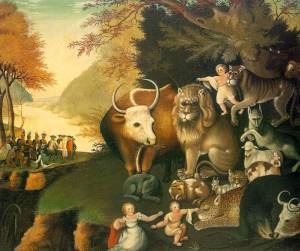
However, just as the urges of nationalism and power often won out over true Christian values in the course of European history, it has been all too common for the actions of Christians to be driven solely by the drive for efficiency, power, and convenience when they interact with God’s Creation. Too often we feel that when it comes time to make decisions about how we treat God’s earth it’s entirely permissible to turn off the “electric current” of God’s love that is to flow through us.
We compartmentalize where we are called to be holy and where we can just do what is convenient and normal in our fallen world.
We can see the result of that around us. We’ve relentlessly pushed back nature. Diminished it. Treated it with violence that our culture does not see as violence. Much of human history has been tragically defined by our drive to meet the needs of ourselves, our communities, our countries, and our species at the wholesale sacrifice of the other living things and the living systems with which we share this world. Too often Christians have too often gone along with this and even been apologists and cheerleaders.
This is the despite the fact that a domineering and self-focused use of our creative powers in the world is not in tune with the chords that we hear in the Bible of how we should be and how we should live.
The sobering challenge, however, with living in this world is that even if we desire to live out a loving, patient, compassionate, and self-controlled life we must still take from the world to survive. We must eat. We must have shelter. Something must die for us to live.
So how do we live out loving lives as followers of God while consuming God’s world?
I believe the beautiful game has something to teach us. Within the limits of love, patience, compassion, and self-control (as well as the other fruit of the Spirit we read of in Galatians 5:22), we can bring all of the creativity we have been blessed with to bear on how we use God’s world. We can minimize our negative impacts and actually contribute to the abundance and vitality of this world.
And people are already doing this, including many Christians. There are countless examples from the business world. Patagonia, for instance, is developing a wet suit made not of petroleum-based neoprene but from a rubber extracted from a desert shrub. Subaru’s plant in Indiana reuses or recycles 99.8% of materials left over from assembly of the vehicles.
You’ll find inspiring examples in agriculture as well. Gabe Brown has attracted considerable attention for the way he and his family are regenerating the health of the land in innovative ways on their diversified 5,000-acre farm and ranch near Bismarck, North Dakota. They have more than doubled soil organic matter by using no-till methods combined with cover cropping that uses diverse seed mixes and grazing with multiple species. The result is a place that is full of life and exceptional productivity without the need for synthetic fertilizers, pesticides, or fungicides. The home page of the Brown Ranch website begins this way:
“We believe that faith, family and working with the natural resources that God has provided allows us a meaningful life. We enjoy using these resources to regenerate landscapes for a sustainable future.”
God calls for us to live just this way – creatively, energetically, and passionately. Indeed, part of what it means to be human and to be created in God’s image is an ability and a drive to be creative. We are not merely to avoid doing bad but to proactively do good. We are to be “peacemakers” as we read of in Matthew 5:9.
Our tremendous creative capacities, both as individuals and groups of people, are to be used within the limits of what God desires from us, limits that are defined by love and justice and peace. One of the limits defined by love is the commitment to flourishing in a way that does not diminish the ability of life on God’s earth to flourish.
Living out a whole faith within God’s beautiful kingdom should and will produce a beautiful life and a beautiful world. And living that way offers the enjoyment to which the Brown Ranch mission statement refers.
Living that way should be our goal every day (pun intended!).
Living that way, even as we wrestle with the practicalities of survival and the flourishing of our communities and families, is one of the great challenges of the Christian life. It will require from us every bit of wisdom, artfulness,humility, creativity, and Spirit-inspired teamwork within the body of Christ that we can muster.
Let’s get on with it.


